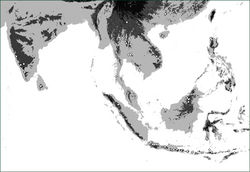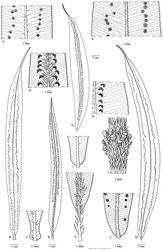Oleandra coriacea
| Notice: | This page is derived from the original publication listed below, whose author(s) should always be credited. Further contributors may edit and improve the content of this page and, consequently, need to be credited as well (see page history). Any assessment of factual correctness requires a careful review of the original article as well as of subsequent contributions.
If you are uncertain whether your planned contribution is correct or not, we suggest that you use the associated discussion page instead of editing the page directly. This page should be cited as follows (rationale):
Citation formats to copy and paste
BibTeX: @article{Hovenkamp2012PhytoKeys11, RIS/ Endnote: TY - JOUR Wikipedia/ Citizendium: <ref name="Hovenkamp2012PhytoKeys11">{{Citation See also the citation download page at the journal. |
Ordo: Polypodiales
Familia: Oleandraceae
Genus: Oleandra
Name
Oleandra coriacea Hovenkamp & Ho, 2012 – Wikispecies link – Pensoft Profile
- Oleandra coriacea Copel. J. Straits Branch Roy. Asiat. Soc. 63: 72. 1912. Type: MALAYSIA. Borneo:Moulton s.n.(SAR? not seen).
Description
Rhizome with creeping parts unknown, aerial stems unbranched and rootless, 2–3 mm thick (when dry), not white waxy, in cross-section with a distinct sclerified peripheral sheath and few, scattered sclerified strands, phyllopodia in weak to distinct clusters of 4–6, short, usually less than 5 mm long. Scales persistently covering the rhizome, peltate, 5–70 × 0.5–1 mm, appressed (sometimes spreading), dark, shining with pale to brown margin and acumen, margin ciliate especially when young. Fronds monomorphic; stipe 1–1.5 cm long, without dark colouration, with up to 1 mm long glandular hairs and often small, appressed scales; lamina 13–30 × 1.2–3.3 cm, linear, base narrowly cuneate to rounded, apex acuminate to caudate with cauda to 1.5 cm, texture coriaceous; costa and veins on lower surface densely hairy with up to 1 mm long, acicular hairs, costa without dark colouration, with copious, conspicuous, 3–4 mm long pale to brown scales, upper surface more glabrous, mostly hairy on the costa only, with similar hairs and with less copious scales. Sori in a single more or less irregular medial row, separated from the costa by a 2–7 mm wide sterile zone, indusium distinct, c. 1.5 mm wide, most often glandular. Sporangial stalk with glands below the sporangium. Spores with coarse confluent ridges, areolae with short pointed excrescences, perispore hollow, with internal baculae, outer layer distinctly perforated.
Distribution
Brunei, Indonesia: Kalimantan Timur; Malaysia: Sarawak.
E
cology
Terrestrial in montane forest, mainly on ridges and in summit vegetation, 1100–2200 m.
Discussion
Creeping and rooting parts of the rhizome are absent in all collections seen, but presumably present, as in Oleandra neriiformis. The lamina of Oleandra coriacea is indeed much more coriaceous than Oleandra neriiformis, and has copious large pale costal scales and long hairs especially on lower surface. The sori are consistently medial, with firm indusia that are often clearly glandular on their surface.
Taxon Treatment
- Hovenkamp, P; Ho, B; 2012: A revision of the fern genus Oleandra (Oleandraceae) in Asia PhytoKeys, 11: 1-37. doi
Images
|

